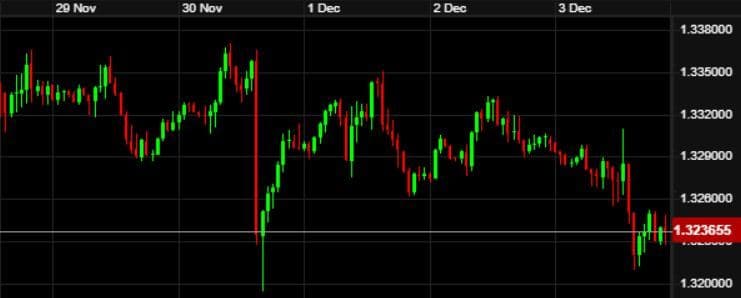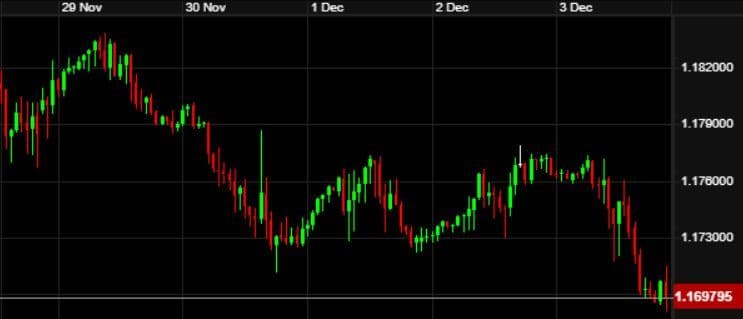Client Newsletter - 06-12-21
The new Omicron variant made for cloudy skies over the currency markets at the start of last week, before Non-Farm Payrolls caused volatility on Friday. On the regular topic of inflation, Jerome Powell retired his favourite buzzword and whilst Eurozone inflation remains high, an ECB member thinks “November will prove to be the peak”.
It was almost like we were back to mid-2020 at times last week with the Omicron variant arguably moving markets more than economic data releases at times. As the world tries to understand the impact of the latest coronavirus variant, various countries made rapid changes to their border policies, with the travel sector naturally the worst hit.
Australia delayed a further easing of restrictions by at least a fortnight, whereas Singapore opted to tighten its own measures. As usual, safe-haven currencies such as the Swiss Franc, Japanese Yen and also the US Dollar have strengthened as a result.
Tuesday was all about inflation, as has often been the case lately. Figures from the Eurozone offered a flash estimate for November for year-on-year inflation to be hitting 4.9%, which equates to a rise of 0.8% on last month. Within that figure, Spain and Belgium both reported 5.6%, trumped by Germany at 6%. The supply chain issues and a global shortage of microchips have definitely not helped that figure.
On that topic, German ECB member Isabel Schnabel commented that she believes “November will prove to be the peak” on the subject of inflation. She cited supply bottlenecks and energy price growth levelling off both being contributory factors in inflation getting back down to the 2% target “next year”. For now, this seems ambitious to put it mildly.
Meanwhile in the US, Fed Chair Jerome Powell caused some frantic movement for the Dollar with his comments around, you guessed it, inflation! To print a quote from his testimony in Washington DC:
“We tend to use the word transitory to mean that it won’t leave a permanent mark in the form of higher inflation. I think it is probably a good time to retire that word”.
‘Finally’ was probably the word on the lips of a lot of economists, as Powell finally resigned himself to the fact that inflation might well be here to stay. However, it was the chairman’s comments on the Fed’s bond buying scheme which caused the majority of the market movement. To give itself more options in the ongoing battle against inflation, Powell has stated it may be necessary to reduce asset purchases quicker than expected. We could well see such a move at the next Fed meeting on 15th December.
Such comments pushed Sterling-Dollar to its lowest levels since just before Christmas 2020. The move of 1.3% in the space of an hour shows what can happen in the markets, and why protecting your risk is always a move worth thinking about. The chart below shows the GBP-USD moves from last week:

Meanwhile, we saw growth figures from Australia which demonstrated the impact from the widespread lockdowns in major cities, in the second half of 2021. GDP data for the quarter to the end of September showed a reduction of -1.9%, with the previous quarter a 0.7% increase. Admittedly, these figures were not as bad as some had expected.
Thursday was a slightly quieter day with Eurozone unemployment as expected at 7.3% for October. This shows a slight drop from 7.4% last month. Overall, GBP suffered against the Euro during the week as the Omicron variant spread, sparking concerns that the Bank of England’s long-awaited interest rate rise might not materialise on the 16th December either. The chart for GBP versus the single currency last week can be seen below:

The weekly report on jobless claims in the US showed a better than expected figure on Thursday afternoon, giving some optimism for a strong Non-Farm Payrolls figure to follow on Friday. But things didn’t quite go that way frankly. With expectations of 553,000 jobs added in November, the actual figure landed at a mere 210,000. Overall unemployment in the US though dropped down to 4.2% from 4.6% the previous month. The Dollar enjoyed a positive afternoon again, almost hitting the lows earlier in the week.
As mentioned, we have seen some sizeable swings this week which go to show the importance of managing your currency exposure efficiently. As we run towards Christmas, there are plenty of significant events to come which could impact purchases. Make sure to reach out to the team for a discussion.
So for the week ahead now and Tuesday is arguably the first significant data release with an interest rate announcement in Australia. The interest rate itself will remain the same almost certainly after previous suggestions from the RBA, but comments in the following press conference will be important. Any changes to their bond buying scheme after recent COVID developments will be important. Equally the German ZEW Economic Sentiment figure will be of interest this month, with a ruling coalition now having been confirmed. How will that impact the confidence in the German economy?
Other than being a bank holiday in Italy on Wednesday, we have a further interest rate announcement in Canada at lunchtime. We aren’t expecting to see any change here either, but any comments regarding the Omicron variant might well have ramifications through other major currencies.
Finishing off a quiet week in terms of data, we have the latest estimate from the NIESR (National Institute of Economic and Social Research) on GDP for the UK economy. The expected figure is 1.0% but has been falling rapidly over the course of recent months. US inflation lands in the afternoon which as always remains a focus, especially now we know it isn’t transitory anymore….
With market events relatively light this week, we could well see COVID changes and developments influencing prices also. These are the type of events which can cause considerable market movements, so if you are keen to protect your upcoming transactions then do reach out to the team this week.
Have a great week.